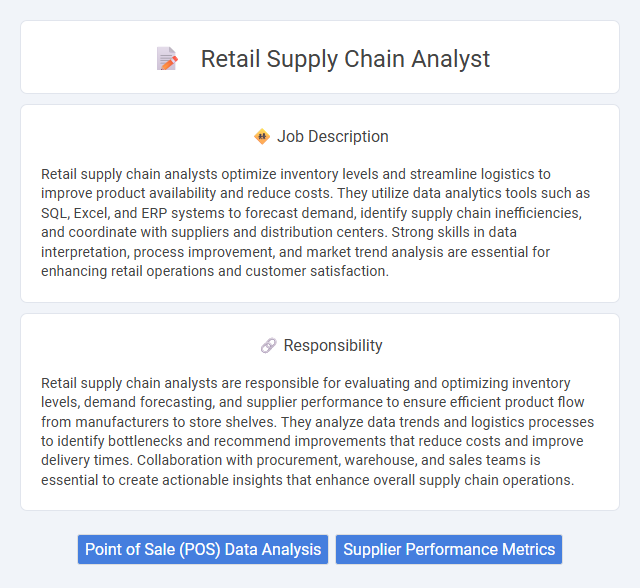
Retail supply chain analysts optimize inventory levels and streamline logistics to improve product availability and reduce costs. They utilize data analytics tools such as SQL, Excel, and ERP systems to forecast demand, identify supply chain inefficiencies, and coordinate with suppliers and distribution centers. Strong skills in data interpretation, process improvement, and market trend analysis are essential for enhancing retail operations and customer satisfaction.
Candidates with strong analytical skills and a passion for data-driven decision-making are likely suitable for a retail supply chain analyst role. Individuals who thrive in fast-paced environments and possess effective communication abilities may find this position aligns well with their strengths. Those less comfortable with continuous problem-solving or adapting to changing market conditions might face challenges in this job.
Qualification
A Retail Supply Chain Analyst requires strong analytical skills and proficiency in tools such as Excel, SQL, and supply chain management software to optimize inventory and logistics. A bachelor's degree in supply chain management, business administration, or a related field is typically essential, with advanced candidates holding certifications like APICS CPIM or CSCP. Experience in data analysis, demand forecasting, and vendor management enhances the ability to improve supply chain efficiency and reduce costs.
Responsibility
Retail supply chain analysts are responsible for evaluating and optimizing inventory levels, demand forecasting, and supplier performance to ensure efficient product flow from manufacturers to store shelves. They analyze data trends and logistics processes to identify bottlenecks and recommend improvements that reduce costs and improve delivery times. Collaboration with procurement, warehouse, and sales teams is essential to create actionable insights that enhance overall supply chain operations.
Benefit
Retail supply chain analysts likely contribute to improved inventory management and demand forecasting, reducing costs and minimizing stockouts. Their insights probably enhance supplier relationships and streamline logistics, increasing overall efficiency. Companies may experience higher customer satisfaction and profitability due to optimized supply chain operations driven by these analysts.
Challenge
Retail supply chain analysts face the challenge of managing complex data flows that impact inventory accuracy and demand forecasting. There is a high probability that fluctuations in market trends and consumer behavior will complicate the optimization of supply chain efficiency. Adapting to rapidly changing technologies and integrating diverse data sources may present ongoing obstacles in decision-making processes.
Career Advancement
Retail supply chain analysts utilize data analytics and inventory management software to optimize product flow and reduce costs in retail operations. Mastery of tools like SAP, Oracle, and advanced Excel modeling enhances decision-making and efficiency in supply chain processes. Career advancement often leads to roles such as supply chain manager or operations director, with increased responsibility for strategic planning and cross-functional leadership.
Key Terms
Point of Sale (POS) Data Analysis
Retail supply chain analysts specializing in Point of Sale (POS) data analysis leverage transaction data to optimize inventory management and enhance demand forecasting accuracy. They utilize advanced analytics tools to interpret sales patterns, identify product performance trends, and align stock levels with consumer purchasing behavior. This data-driven approach reduces stockouts and overstock situations, improving overall supply chain efficiency and profitability in retail operations.
Supplier Performance Metrics
Retail supply chain analysts evaluate supplier performance metrics such as on-time delivery rates, order accuracy, defect rates, and cost compliance to ensure efficient inventory management. They analyze data trends to identify underperforming suppliers and recommend strategies for improvement, enhancing supply chain reliability and reducing operational costs. Accurate supplier performance measurement supports optimized procurement decisions and strengthens partnerships within the retail supply chain.
 kuljobs.com
kuljobs.com